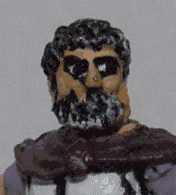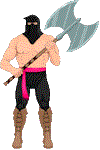Armies from 1066 or later at Irvine 2023
Ottoman Turkish vs Arab Indian
Game 1 Ottoman Turkish vs Feudal Scots
Game 2 Ottoman Turkish vs 100YW French
Game 3 Ottoman Turkish vs Arab Indian
Game 4 Ottoman Turkish vs Norman
Game 5 Ottoman Turkish vs Albanian
The end of day 3 saw the Ottoman Sultan perched precariously towards the upper end of the table, as high as a highland eagle surveying the Scottish mountains from atop a mighty peak.
This would see the Ottomans head eastwards to invade India, taking on an army of elephants and spearmen of a very Arabized flavour indeed
During the period of Arab domination in India from the 7th to the 11th centuries, Indian armies underwent changes due to Arab influence and the establishment of Muslim rulers and dynasties in parts of the subcontinent. The makeup of Indian armies during this period was influenced by both indigenous traditions and Arab military practices. The specifics varied over time and across different regions, but some general features can be outlined:
Cavalry: Arab domination brought an emphasis on cavalry in Indian armies. Muslim rulers and generals often organized and led cavalry units, which were equipped with Arab-style weaponry and tactics. Heavy cavalry, capable of shock attacks, became an integral part of these armies. Arab influence also introduced the concept of mounted archers to Indian armies. These cavalry units excelled at hit-and-run tactics, using their mobility to launch arrows from a distance and then retreat rapidly to avoid counterattacks.
Elephants: Elephants continued to be a significant component of Indian armies. Muslim rulers adopted the use of war elephants from indigenous practices. Armoured elephants, often carrying archers or other troops, were used to break enemy formations, create chaos, and provide a vantage point for archery.
Infantry: Infantry remained an essential part of Indian armies. Indian foot soldiers were armed with a variety of weapons, including swords, spears, shields, and bows. Infantry units were used to form defensive lines, engage in close combat, and support other arms of the army.
Cultural and Religious Influence: Arab domination led to the spread of Islam in India, which had an impact on the makeup of armies. Muslim soldiers fought alongside non-Muslim soldiers, contributing to a diverse composition that often incorporated both Arab and Indian elements.
It's important to note that the composition of Indian armies during the Arab domination period was shaped by a dynamic interplay of indigenous practices, Arab military influence, and the specific context of the regions under Arab rule. Over time, the blending of these influences resulted in unique military strategies and compositions that reflected the evolving dynamics of the era.
The lists for the Ottoman Turkish and Arab Indian from this game, as well as all the other lists from the games at Irvine can be seen here in the L'Art de la Guerre Wiki.
Amidst this grand tapestry of highland history, where empires rose and fall like the tides of destiny amongst the plastic stackable chairs of the local community centre, there unfolded a tale of epic proportions.
This would be a tale of valour, intrigue, and the clash of two mighty empires: the Ottoman Turks and the Arab Indians, duking it out in the mostly featureless plains .
The battlefield stretched out beneath the azure heavens, a vast expanse of arid earth, undulating dunes, and swaying palm trees.
The sultry air quivered with anticipation, and the sun bore down upon the warriors with an unrelenting fervour.
In the shimmering distance, the Ottoman army, clad in gleaming suits of armour adorned with intricate patterns and fierce visages, assembled in disciplined rows to advance and take on the Indians.

The Janissaries, disciplined and fierce, formed a formidable wall of archery, their balding pates glinting in the afternoon light.
Each warrior was a testament to the might of the Ottoman Empire, their blood and loyalty intertwined as opposite them, the Mughal Indian army, with their spearmen and colossal war elephants, a formidable force to be reckoned with.
Bagpipes
The air was charged with anticipation, the scent of battle hung heavy, and the resounding clank of armour echoed like a war anthem on the right hand flank as two walls of cavalry closed and exchanged tentative archery shots, each running right up to the edge of the table leaving no room for outflanking by either side
(or possibly, given the location, they havered up to the side of the table instead)

Arab spearmen, resplendent in colourful turbans and embroidered garments, extended the Indian line in a formidable fashion, their spears glistening menacingly as the battle lines closed on one another
The Truth behind Scottish calls for Independence
Suddenly the battlefield itself erupted into a canvas of chaos and impending doom, a tapestry of dust, sweat, and iron.
The sun continued its descent, casting long shadows as the cavalry of both armies closed the gap on one another to commence the battle.
The earth trembled beneath the weight of the Mughal war elephants, their massive feet pounding the ground like thunder, while the Ottoman cavalry, resplendent in their polished armour and turbans, charged forward with a thunderous roar.
On the opposite flank, the true giants of the battlefield, the war elephants, advanced in a majestic and somewhat singlular formation.
these colossal beasts were draped in ornate silks and adorned with jewels, their tusks painted with intricate patterns, a testament to the opulence of the Indian court and also a wildly attractive target for the Ottoman janissaries had the Indian foot skirmishers been kind enough to jump out of the way.

the two lines of cavalry surged together, and only one came out the other side unscathed.
The first impact had been deafening; the clash of spears and the thundering hooves of horses reverberating through the battlefield.
This clash of civilizations was however turning out to be an unstoppable force meeting a very movable object indeed, as the Ottomans were wiped out almost to a man.
The Scots, Marching to War
The Iyalars, their crazed eyes aflame with bravery, charged forward with unwavering determination.
The Arab Indian spearmen were however unyielding and disciplined, and fought with valour, their spears a deadly extension of their will to resist the supposedly deadly charge of the Ottomans shock infantry.
 The earth then trembled beneath the weight of the Indian war elephants, their massive feet pounding the ground like thunder as they charged forward with a thunderous roar into the line of Janissaries.
The earth then trembled beneath the weight of the Indian war elephants, their massive feet pounding the ground like thunder as they charged forward with a thunderous roar into the line of Janissaries.
Amidst the chaos, the war elephants, their eyes painted with warlike fierceness, trumpeted loudly. Their colossal frames were proving invincible, the Ottoman army was falling like autumn leaves in the afternoon sun, and the game was now slipping irredeemably away from the army from Istanbul.
This clash of empires had been a spectacle of courage, valour, and the inexorable march of history - and those writing that history were doing so in the complex script of India, not the Turkic tongue.
Amidst the dust and the din, the fate of the Ottoman empire slipped sadly away as the world watched in awe and trepidation.
The Result is a defeat for Ottomania
Click here for the report of the next game in this competition, or read on for the post match summaries from the Generals involved, as well as another episode of legendary expert analysis from Hannibal
Post Match Summary from the Ottoman Turkish Commander

India, a land known for its exotic curry and fragrant naan bread, posed challenges that were beyond our control. Our noble army, brave as ever, encountered formidable adversaries - elephants, stoic spearmen, and charging cavalry. These foes, while formidable, proved themselves crafty, just like a cunning chef adding spices to an intricate curry.
The elephants, with their towering presence and unyielding strength, became living fortresses on the battlefield. Our attempts to subdue them were akin to trying to tame a wild beast, untamed and fierce.
The stoic spearmen, with their unflinching resolve, stood as steadfast as a tandoor oven, impervious to our assaults. Their discipline and unwavering determination were unlike anything we had faced before (except maybe everything in the first 2 battles).
And the charging cavalry, like a tempest sweeping across the Ganges, took us by surprise, trampling our forces with a ferocity that we could not have anticipated.
But I must emphasize that it is not my fault, nor the fault of our glorious empire, that we faced such adversity. It was merely the hand of fate, a twist of destiny that conspired against us. Just as a spice merchant can never predict the precise blend of flavours in a curry, we could not have foreseen the intricate web of challenges that awaited us in India.
Let us not forget the indomitable spirit of our soldiers, who fought valiantly despite the odds. Their sacrifices shall not be in vain, and their legacy will live on in the annals of history, and the khazi's of Kashmir.
In conclusion, let us not dwell on the temporary setback in our Indian campaign. Instead, let us focus on the vastness of our empire and the glory that awaits us in the future. The defeat we faced is but a passing cloud in the expansive sky of our ambition. Like a skilled chef, we will adapt our strategy, learn from our mistakes, and return to conquer with even greater fervor.
Hannibal's Post Match Analysis
 I, Hannibal Barca, a master of the art of war, find myself compelled to address the pitiable performance of an Ottoman Sultan, amusingly named Sultan McTavish, in his recent campaign in India. It is with a heavy heart that I must ridicule this so-called leader, who's wit is so feeble, even a Turkish tea kettle doth outshine it in its steamy wisdom, for his breathtaking incompetence and woeful blunders on the battlefield.
I, Hannibal Barca, a master of the art of war, find myself compelled to address the pitiable performance of an Ottoman Sultan, amusingly named Sultan McTavish, in his recent campaign in India. It is with a heavy heart that I must ridicule this so-called leader, who's wit is so feeble, even a Turkish tea kettle doth outshine it in its steamy wisdom, for his breathtaking incompetence and woeful blunders on the battlefield.
Sultan McTavish, whose name sounds like a mishmash of confusion, has proven himself to be a military buffoon of the highest order. It is quite baffling that he was entrusted with an army when he couldn't lead a parade of elephants through a spice bazaar in Bombay without causing chaos.
One cannot help but marvel at the sheer absurdity of the Ottoman Empire's refusal to adopt the use of elephants in warfare, a mastery I myself demonstrated so brilliantly. It's as if they insisted on attacking their enemies with roti bread instead of wielding the majestic might of these magnificent creatures.
Oh, Sultan McTavish, your strategic acumen was as clear as a glass of lassi left out in the Indian sun for a fortnight. Your military decisions were as tasteless as a curry made without spices, leaving your army as bland and unappetizing as overcooked rice.
It is with great amusement that I observe the Sultan's inability to comprehend the intricacies of warfare in India. Had I been in command, I would have orchestrated maneuvers so brilliant that they would have left the Indian armies flummoxed, like a chicken trying to decipher the secrets of a masala sauce.
In conclusion, it is evident that Sultan McTavish's sheer ineptitude and bewildering lack of military prowess have sullied the Ottoman Empire's reputation and is indeed the embodiment of Turkish coffee, strong but bereft of any discernible intellect! I, Hannibal Barca, offer my condolences to the empire for having such an incompetent leader at its helm.
Let this be a lesson to all who dare to lead armies into battle: the true mastery of warfare requires brilliance and adaptability, qualities sorely lacking in Sultan McTavish. May the Ottoman Empire reflect upon its comical mistakes and strive to elevate itself to a level of military competence worthy of the great empires of history.
Long live the legacy of Hannibal, the unmatched general of history, and may the Ottoman Empire one day rise above the culinary catastrophe that is Sultan McTavish's leadership, perhaps even as soon as the next game?
Click here for the report of the next game in this competition
You may also like....
Game 1 Ottoman Turkish vs Feudal Scots
Game 2 Ottoman Turkish vs 100YW French
Game 3 Ottoman Turkish vs Arab Indian
Game 4 Ottoman Turkish vs Norman
Game 5 Ottoman Turkish vs Albanian
View My Stats for My Match Reports Pages

























